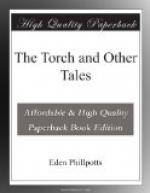“Then we shall have gospel truth for certain,” said Harry Wade, with his eyes on Millicent Meadows.
“Oh, yes,” answered Silas, “because my grandfather could call home the taking of Canada and many such like far-off things, so that shows you the sort of memory he’d gotten. But nowadays the learning of the past be flouted a good bit and what our fathers have told us don’t carry no weight at all. Holy spells and ghostesses and—”
“You get on to Hound Pool, Silas,” said John Meadows, “because Parsloe will have to go to his work in ten minutes.”
“The solemn truth be easily told,” declared Mr. Belchamber. “Back along in dim history there was a weaver by name of Knowles who lived to Dean Combe. Him and his son did very well together and he was a widower with no care but for his work. Old Weaver, he stuck to his yarn and was a silent and lonely fashion of man by all accounts. Work was his god, and ’twas said he sat at his loom eighteen hours out of every twenty-four. Then, coming home one evening, the man’s son heard the loom was still and went in and found old Knowles fallen forward on the top of his work, dead. So they buried him at Buckfastleigh.
“Then young Knowles, coming home to his empty house after the funeral, suddenly heard the music of the loom and thought his ears had played him false. But the loom hummed on and he crept up over to see who was weaving. In a pretty good rage he was, no doubt, to think of such a thing; but then his blood turned from hot to cold very quick, I warn ’e, for there was his father sitting on the old seat and working weft through warp as suent and clever as if he was alive!
“Well, young Knowles he glared upon his dead parent and felt the hair rising on his niddick and the sweat running down his face; but he kept his nerve pretty clever and crept away and ran for all his might to the village and went to see Parson. They believed more in those days than what they do now, and Parson, whatever he may have thought, knew young Knowles for a truth-teller and obeyed his petition to come at once. But the good man stopped in the churchyard and gathered up a handful of sacred ground; and then he went along to the dead weaver’s house.
“Sure enough the loom was a-working busy as ever; but it couldn’t drown Parson’s voice, for he preached from one of they old three-decker pulpits, like a ship o’ war, and his noise, when the holy man was in full blast, would rise over a thunderstorm.
“‘Knowles! Knowles!’ he cried out; ’Come down this instant. This is no place for you!’
“And then, hollow as the wind in a winter hedge, the ghost made answer.
“‘I will obey so soon as I have worked out my quill, your reverence,’ replied the spirit of Weaver Knowles, and Parson didn’t raise no objection to that, but bade the dead man’s son kneel down; and he done so; and the priest also knelt and lifted his voice in prayer for five minutes.




